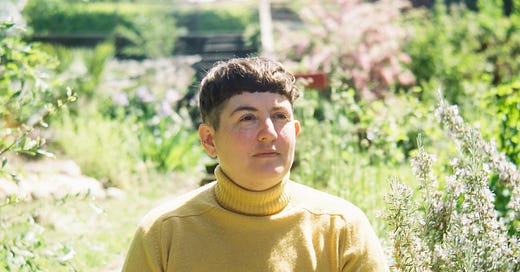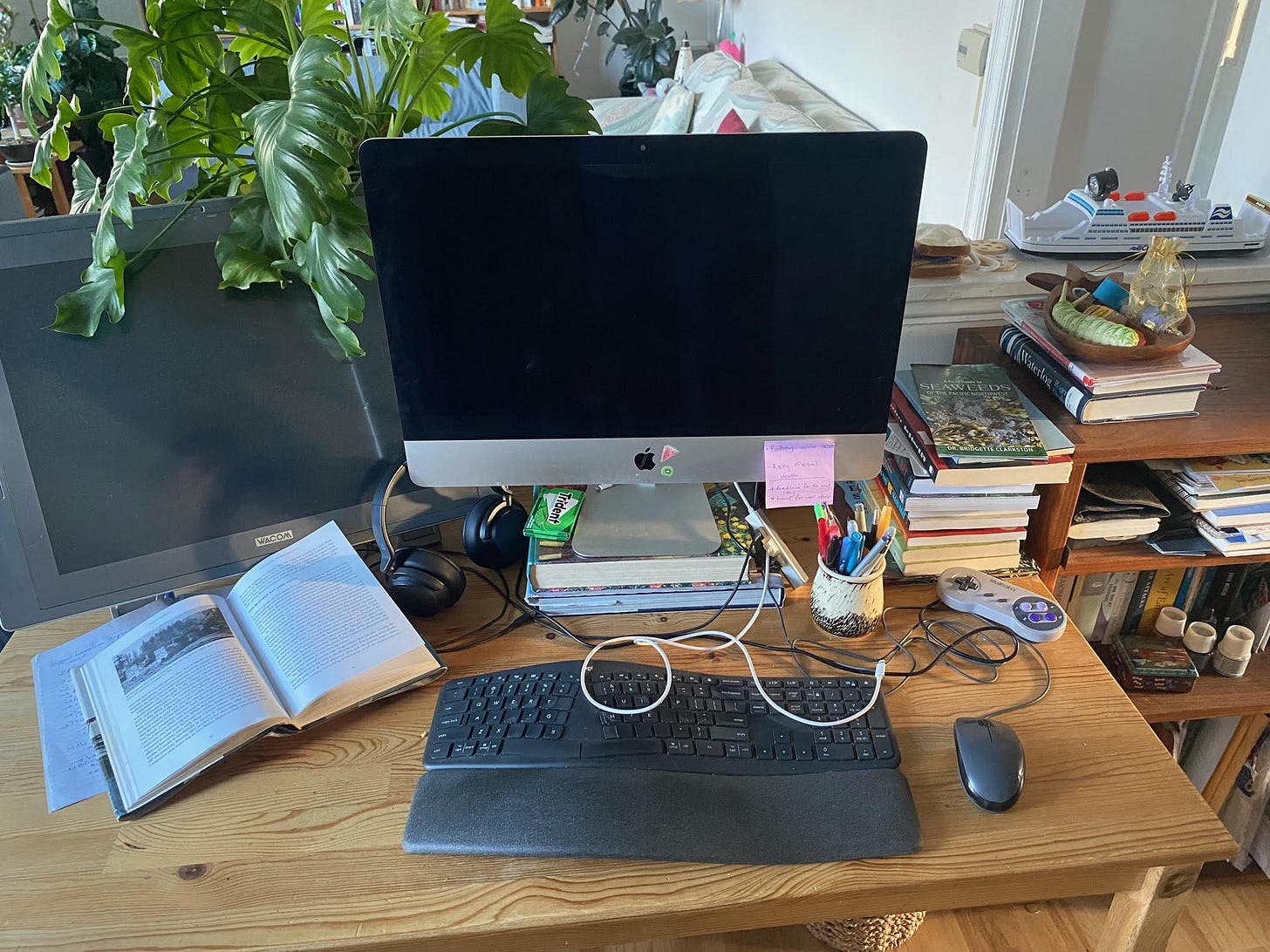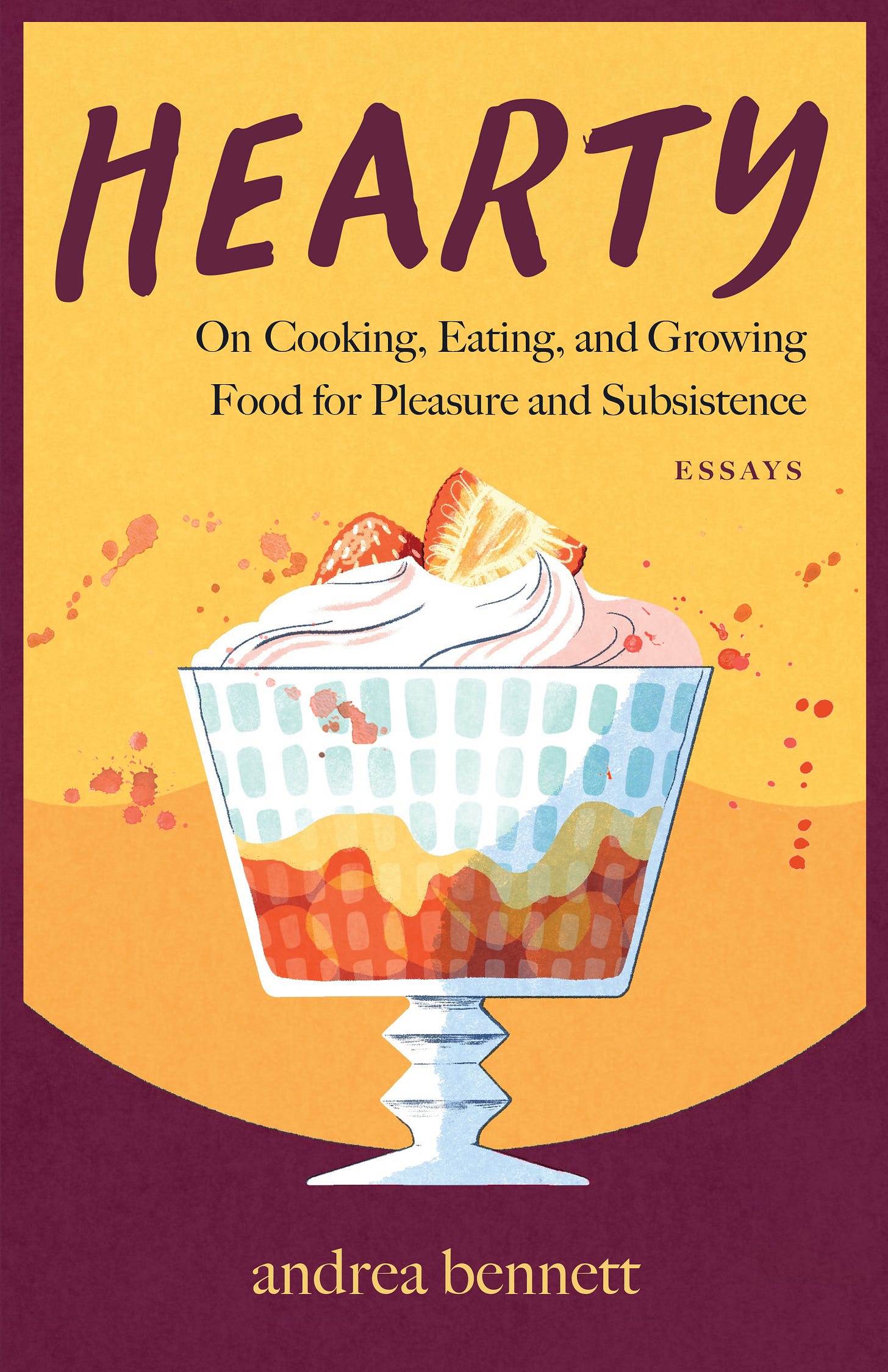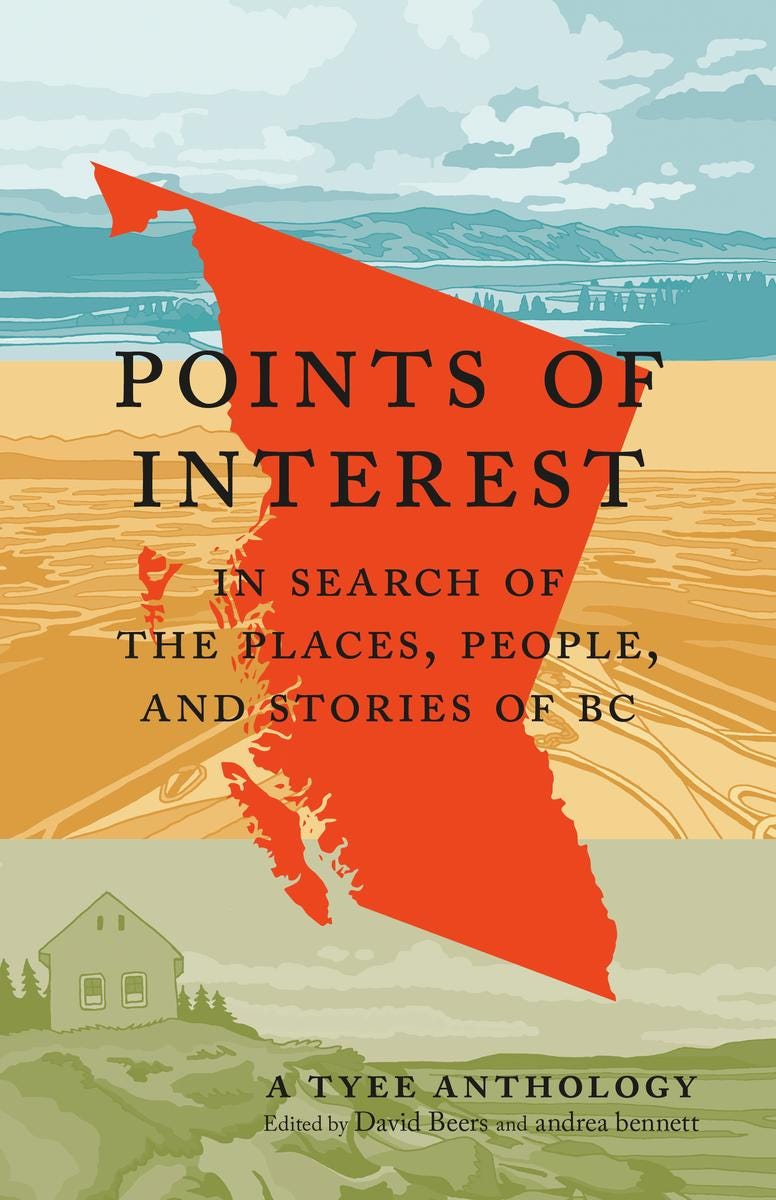andrea bennett is a National Magazine Award–winning writer and a senior editor at The Tyee. Their writing has been published by The Walrus, Chatelaine, The Atlantic, the Globe and Mail, and many other outlets. Their first book of essays, Like a Boy but Not a Boy, was one of CBC Books’ 2020 picks for the top Canadian nonfiction of the year. Originally from Hamilton, bennett is now back on the west coast in Powell River, BC, after a stint in Montreal.
Their latest book, Hearty: On Cooking, Eating, and Growing Food for Pleasure and Subsistence, was published on September 24, 2024 by ECW Press.
“Good memoir writing about food gets at sensory experience and tactile memories, yes. But bennett's essays on eating and feeding others open up the reader's mind to what makes the genre truly great: the act of staying fed being as frustrating as it is calming, and as revealing about inequality as it is nourishing to body and mind.”
— Chantal Braganza, deputy editor, Food, Chatelaine
Describe your writing space. What do you love about it?
The mild irony of having written this book about growing, cooking and eating food is that having a young child and working as an editor (for TheTyee.ca, check it out!) and living in a small city means that to get this book written, I had to leave my house and go hide out somewhere a couple mornings a week before work. And the only place that was open was the Starbucks. So I wrote much of this book at the Starbucks. And at my desk, which is in the foyer of our house, after my kid was in bed. What I love about the Starbucks is that it was open when I needed it to be open.
Any rules for when you’re in this ‘space’?
Have you seen the dog on Instagram who puts on his “quiet ears”? It’s a little Eeyore hat that encourages him to stop barking. I think of my noise-cancelling headphones as my quiet ears. They’re a physical cue that I’m transitioning to writing. I generally also have a soundtrack or even just one song for each project I’m working on. I’ll use that song as another form of transitional cue.
How important is it to have ‘a room of one’s own’?
I think I’ve maybe focused instead on creating a bubble of one’s own, wherever that happens to be. It’s important to find focus. But it’s also important to be in community, I’d say, for the big chunk of the writing iceberg that stays underwater—the research part, the conversations part, the figuring out what I might have to offer part.
Very occasionally, I take weekends away when I really feel like I need to focus. My partner works on Saturdays now, so that involves either him taking the day off work, or us figuring out childcare. It’s trickier when you have kids and want or need to be around to be an active part of raising them. Writing residencies aren’t really designed to support parents.
What is your writing practice like?
It’s very deadline-oriented for non-fiction. I’ll pitch or sell the work, and then I owe it to someone, and that’s a big motivator.
For poetry, it’s more or less the opposite. I need leisure time. I can’t force myself to sit down and write. I need to be out in the world, noodling about and experiencing and processing. If I’m stressed out or overly busy, I won’t write a poem for months. I’ll start to think, OK, well, the poetry well has dried up. No more poetry! Poetry over forever.
Do you quantify your process by word count or hours spent writing?
Generally, when I’m on deadline, I will quantify it by time, and cram in extra chunks of time if need be.
What is your creative process like?
For non-fiction, it begins with a question. Or an assumption I would like to question. And from there, I do targeted reading in that area of inquiry, and I also read other essays or books that I’m hoping will influence me in a less targeted way—it might have more to do with enjoying someone’s approach to writing about a semi-related topic. I do interviews, and site visits, and on-the-ground research. If I’m writing an essay, I might figure out what, from my life experience, is relevant. After I have a draft, I’ll repeat that process of targeted and less-targeted reading and give myself some time to process and return to what I’ve written. I like nonfiction that balances scene, or action, with processing and exposition. So the experiences that feed into that scenic work have to be there.
What is the easiest and most difficult part of the process for you?
Easiest: on-the-ground reporting. It’s fun. And it often means I get to bike or ferry or bus or fly somewhere and see new things and meet new people.
Most difficult: post-publication publicity. I prefer to be the person asking the questions. Answering them, you’re sort of quite vulnerable. I think it’s probably healthy to wonder from time to time as a writer if you’ve just been lucky and failed upwards. But it’s a bit of a trip to be out there in the world having those thoughts.
“I feel very lucky that people are reading my work, of course, and grateful. But also, if I’m honest, it’s just a constant low-level mild terror.”
Why do you write? What do you love about writing?
I write to work my way through things I have questions about. Things that are plaguing me in a good way or a bad way. I write because it offers me a good excuse to ask other people these questions and hear what they have to say.
You might notice I’m talking mostly about the researching process there. I agree with whoever said that writing is thinking. I like the challenge. I like when a metaphor or an image falls into place. Sometimes I hate the actual writing part of things and feel stuck and frustrated, and then having a deadline forces me to just start typing. Ten percent of the time, though, when things are really working, it feels great. And there’s nothing I love more than to chase some dopamine.
How do you manage writing with other demands on your time?
By creating deadlines and working back from them, stealing time from sleep, exercise, and other leisurely pursuits. Eating more frozen pizza than usual. Relying on my partner to do more solo school drop-offs, when we usually do them together.
What has influenced you most as a writer?
Curiosity. Reading someone’s work and thinking, “holy shit, how did they do that?”
Do you want each book to stand on its own, or are you trying to build a body of work with connections between each book?
I’ve written each book so that it stands on their own, but there are thematic connections between Like a Boy but Not a Boy, the berry takes the shape of the bloom, and Hearty. In some ways, the berry takes the shape of the bloom, which is poetry, contains much of what I could not express in straight essayistic prose as I was writing Like a Boy but Not a Boy. I needed to express it in ways that invited the reader to bring themselves into the work and make some leaps.
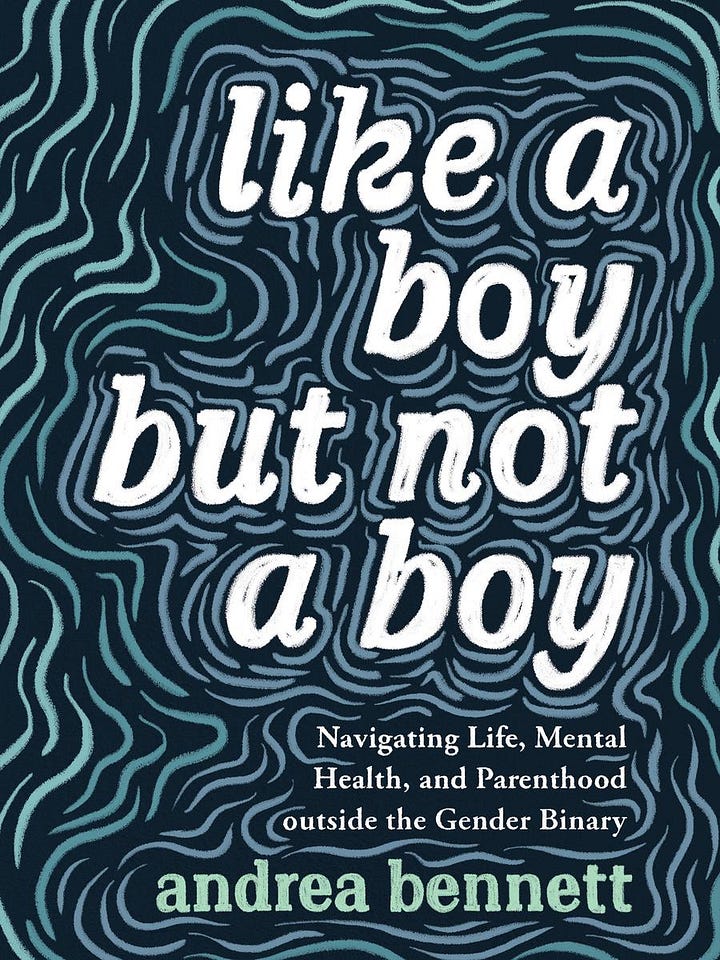
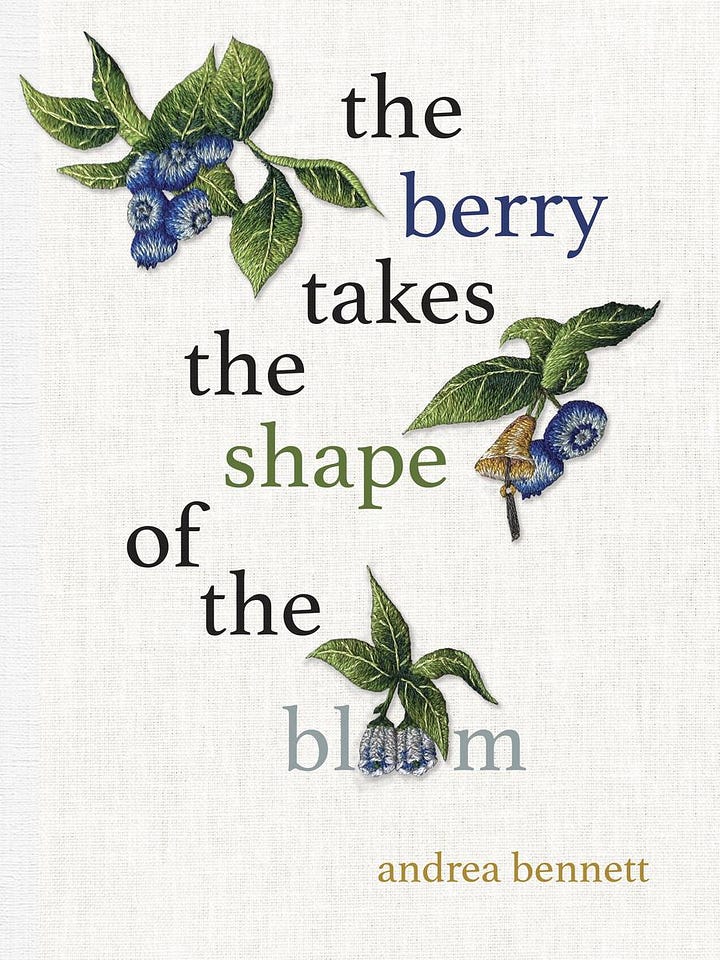
Best advice you’ve ever been given.
When you get a writing grant, put at least twenty percent of it aside for taxes.
What does success look like to you?
I think for a lot of us success looks like the next step up from where you are.
When I was in school, I defined it for myself as getting to do this—editing, writing—for a living. I do now get to do that.
Success is also knowing that I did the absolute best I could with a piece of writing. I did what I set out to do, and I did it with curiosity, and I took my time, and I asked the right questions, and I revised until it was as good as I could get it. I think it’s so important to develop an internal compass about the work itself. One that folds in external feedback, positive and negative, but is strong in and of itself.
Tell us a few things that would surprise us to learn about you: the person, the writer.
I love to swim. A lot. I learned, when everyone was masking during the earlier days of COVID, that I’ve been hard of hearing my whole life. It’s tinnitus city around here. I lip-read to get by. Who knew?
What can books teach us? How do they change us?
I don’t approach books with the idea that they might change me or even teach me anything. I prefer to approach them with the idea of pleasure and surprise. But then of course, because writing is thinking, they offer a way into other people’s interiorities. And their life experiences. And so you learn a lot. I think being open to learning and changing is really important.
“Books can offer us a way to keep learning and changing.”
What was a transformative book for you in your life?
Anne Carson’s Short Talks, Suzanne Buffam’s The Irrationalist. Alice's Adventures in Wonderland, if I’m honest, and Watership Down, and Persuasion. There are so many.
Which authors, living or dead, would you most like to discuss writing with?
Kim Fu. Thankfully for me, she is my best friend.
Who are your favourite writers writing today?
Naben Ruthnum, Christopher Cheung, Alicia Kennedy, Michael Winter. And I feel like it’s dishonest not to mention that I have now listened to every single Michael Connelly audiobook available through my library. There are a lot of Michael Connelly audiobooks. They fall into the genre of what some folks call “copaganda.” Like Law & Order SVU. But they’ve saved me from anxiety-related insomnia. So there you go.
What books are you currently loving?
It’s a cookbook—does that count? Falastin, by Sami Tamimi and Tara Wigley. Their discussions around Palestinian foodways are as good as the recipes, which are ridiculously delicious. I cannot believe I can make falafels that good in my own kitchen.
If you were a bookseller what 5 books would you hand-sell to readers and why?
Points of Interest: I’m biased, because I co-edited it with David Beers, but it’s a really fun, informative anthology of essays about B.C.
Carly Butler’s Apocalypse Child: Butler grew up believing that the world was going to end on Y2K. In unpacking her evangelical Christian childhood, she offers insights I think are so key for understanding a certain aspect of our political moment.
Laura Trethewey’s The Deepest Map: I love a book that combines science with snappy, taking-you-there writing with existential questions about why some humans feel such a need to get to places humans have never been before.
Ricardo Tranjan’s The Tenant Class: Tranjan asks, and then answers, a very pressing, salient question: What if there is no housing crisis, but instead a housing market working exactly as intended?
Michael Winter’s The Death of Donna Whalen: I used to say it was my favourite novel of the last decade, but it’s been over a decade now. Craft-wise, I’m still in awe of it.
What advice do you have for writers?
Edit with the reader in mind. Don’t write with the reader in mind. But when it’s time to edit, be a bit merciless with yourself. Start strong. Start in the middle. Delete throat-clearing and unnecessary exposition. Keep it moving!
“And, of course: when you get a writing grant, put at least twenty percent of it aside for taxes.”
Thank you andrea bennett!

